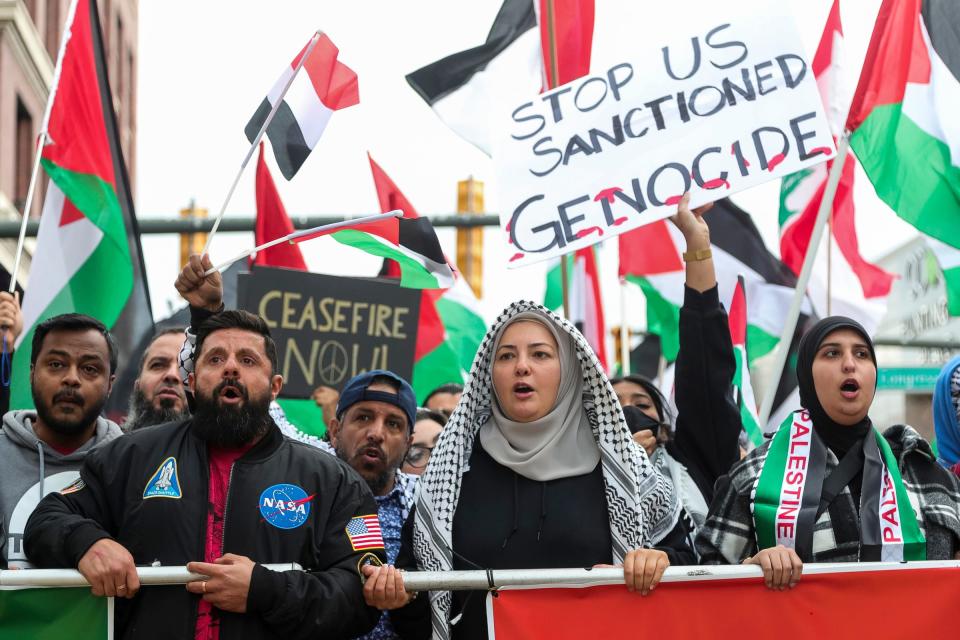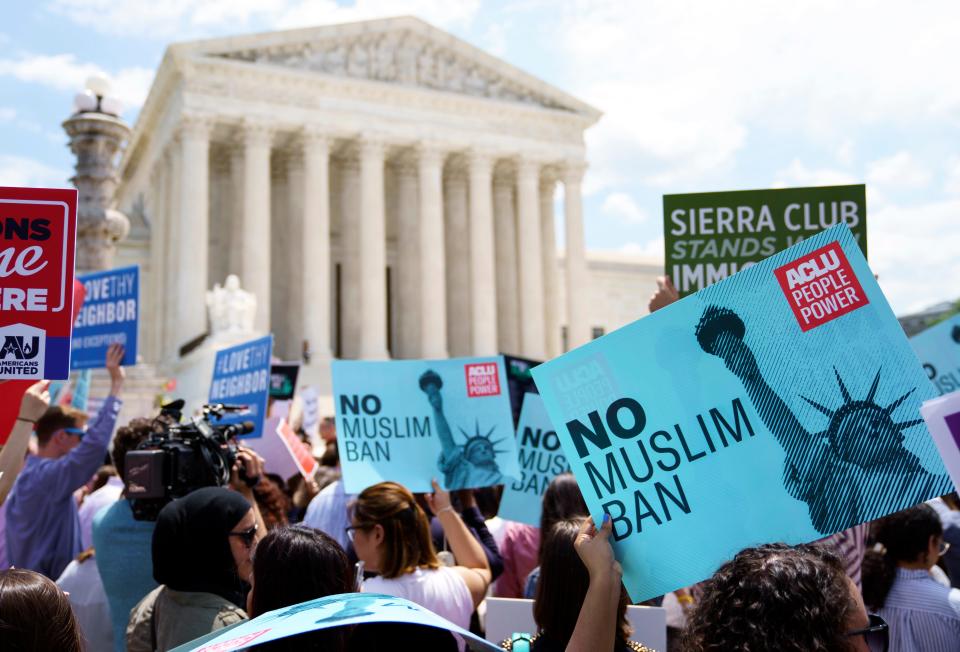Trump, other Republicans call for travel restrictions, sparking new 'Muslim ban' fears
- Oops!Something went wrong.Please try again later.
- Oops!Something went wrong.Please try again later.
- Oops!Something went wrong.Please try again later.
The doors to Adam Abusalah's local mosque, once open to the public, are now locked.
Since Hamas militants' deadly surprise attack on Israel on Oct. 7, leaders at Abusalah's Detroit mosque have increased security during prayer times. It's a drastic move in a community that prides itself on welcoming Muslim immigrants from around the world, including Abusalah's Palestinian American family.
"Not only are we mourning the lives of people we lost in Palestine, but we have to worry about our safety," said Abusalah, 22. "We are talking about safety during prayers. Right now if you go, the doors are locked, but there is someone at the door who lets you in – that’s not normal."

As Jews face a surge in antisemitism and hate speech, Muslims in the U.S. say they also face a flare-up of Islamaphobia not seen since 9/11. They're not just worried about rhetoric; they fear a new wave of retaliatory policies.
More: Online hate surges after Hamas attacks Israel. Why everyone is blaming social media.
At least a dozen Republicans in Congress and two on the campaign trail – including former President Donald Trump – are calling for another so-called Muslim ban that could restrict travel to the U.S. from Muslim-majority countries. They've introduced legislation to bar Palestinian refugees and called on the president to revoke the visas of anyone supporting Hamas.
The proposals are "reminiscent of post-9/11" said Zainab Chaudry, Maryland director for the Council on American-Islamic Relations, or CAIR.
"The fear of being profiled and being discriminated against because of one’s identity is very much at the forefront of many Arab American and Muslim Americans’ minds," she said, as the Israel-Hamas war enters its fourth week.
In a surprise attack on Israel during a major Jewish holiday, Hamas fighters killed more than 1,400 Israelis and kidnapped more than 200 people, including children. Victims of the Oct. 7 Hamas attack were executed, bound and burned alive; bodies were found decapitated.
Israel responded to the terror with overwhelming force. Israeli airstrikes on the Gaza Strip destroyed neighborhoods and killed thousands of Palestinian civilians before Israel launched its ground invasion. The Hamas-run Gaza health ministry says at least 9,061 Palestinians have been killed, most of them women and children, and more than 32,000 have been wounded.
More: Hamas built a massive tunnel network in Gaza. Here’s how Israeli ‘weasel’ forces will fight it
Trump proposes 'strong ideological screening' of immigrants
At Republican primary campaign rallies in Iowa and New Hampshire this week, Trump said he would ban Gaza refugees, begin "strong ideological screening of all immigrants" and reboot his ban on travelers from Muslim-majority nations if he wins a second term in office.
"Remember when they said, 'Oh that's so vicious'? But it kept us safe," Trump said Monday after filing for the New Hampshire primary.
Trump's original order – signed during his first week in office – banned foreign nationals from seven predominantly Muslim countries from entering the U.S. It suspended entry of all Syrian refugees indefinitely and stopped any other refugees from coming into the country for four months.
The 2017 order took effect overnight, catching many travelers by surprise and creating chaos at international airports. Some families were separated for years. The ban didn't just affect Muslims: Christian Arab Americans also found their families swept into the travel restrictions.
Last week, Republican Sen. Steve Daines of Montana introduced legislation that would bar anyone holding a Palestinian Authority passport from entering the U.S. and prevent the Department of Homeland Security from granting entry through its parole program. Daines didn't respond to an emailed request for comment.
Others want the Biden administration to revoke the visas of people already in the U.S. if they're found to support Hamas.
Sen. Marco Rubio, joined by 10 other Republican senators, is seeking a resolution asking the Biden administration "to enforce the law" and "revoke the visas of foreign nationals who endorse or espouse activity in support of Hamas." It wasn't immediately clear what would qualify as an endorsement of Hamas. Rubio didn't respond to an emailed request for comment.
In Florida, Gov. Ron DeSantis moved to disband at least two pro-Palestinian student groups at public universities, claiming their members support "terrorism" and their protests don't constitute free speech.
There is a through-line to Democratic actions in Congress that laid the groundwork for Republican proposals, said Robert McCaw, government affairs spokesman for CAIR. In 2014, during the Syrian conflict, a Democratic Congress subjected a list of countries to additional restrictions that persist today.
"There is a persistent concern in the American Muslim community that our family members’ visas are being subjected to extreme visa vetting and the situation only gets worse in times of conflicts," McCaw said. "We’re not looking at new restrictive policies; we’re looking at additional restrictive policies."
'Families were kept apart'
The proposals are concerning for Arab Americans of all faiths and Muslims, in particular, whose communities across the United States are majority-immigrant and whose families are likely to be of mixed immigration status.
More than half of U.S. Muslims are immigrants, according to Pew Research, owing largely to the 1965 Immigration and Nationality Act that lowered barriers to immigration from regions outside Europe.
"Families were kept apart by the ban," said Omar Jadwat, director of the American Civil Liberties Union's Immigrant Rights Project. The ACLU fought Trump's "Muslim ban" executive order to the Supreme Court, which upheld the order.

"It very clearly sent the message to Muslims here and abroad – perhaps most poignantly to American Muslims – that the president was hostile to their religion," he said.
On his first day in office in 2021, President Joe Biden ended the Trump travel ban with a proclamation "ending discriminatory bans on entry to the United States." He called the bans on entry from Muslim-majority and African nations a "stain on the national conscience" that "separated loved ones, inflicting pain that will ripple for years to come."
'As American as anyone else'
Born and raised in Dearborn, Michigan, Abusalah said he is "as American as anyone else." He posts selfies on Instagram wearing the blue-and-gold gear of the University of Michigan Wolverines and has worked on Democratic campaigns, including Biden's 2020 race.
He is also proud to be Palestinian, his connection to his roots instilled by his 98-year-old grandmother, his Sity, who lives next door and tells him stories of "the old days." His Palestinian parents were both born in Jerusalem and immigrated to the U.S. in the 1970s and 1980s. He has extended family in the West Bank, Jordan and Syria.
He traveled to the region for the first time in August. He surprised his parents during their travels and met his aunts and uncles for the first time. When the war broke out, he canceled his plans to return in November.
Now, he can't stop thinking about his family's homeland and the persistent feeling that maybe he isn't welcome in the country of his birth.
"Right now, I feel my country hates me," he said.
Biden's campaign trail promise to end the Muslim restrictions was one of the reasons Abusalah joined his 2020 presidential campaign. Abusalah's sympathies are with Palestinians, and he is angry Biden hasn't called for a cease-fire.
Biden has stopped short of calling for a cease-fire in the war, saying Israel has a right to defend itself. Hamas must release its more than 200 hostages "and then we can talk," Biden said on Oct. 23. Five hostages have been returned to Israel.
Should any of the Republican proposals prevail, Abusalah and his family may struggle to reunite again in the near future.
"I have people in my family who are immigrants and some who don’t have an American passport, and it is already so difficult," he said. "With all this going on it’s going to be even more difficult."
More: Tensions boil as Israel-Hamas war rages. How do Jewish, Muslim Americans find common ground?
This article originally appeared on El Paso Times: Trump calls for 'ideological screenings' ignite 'Muslim ban' fears

